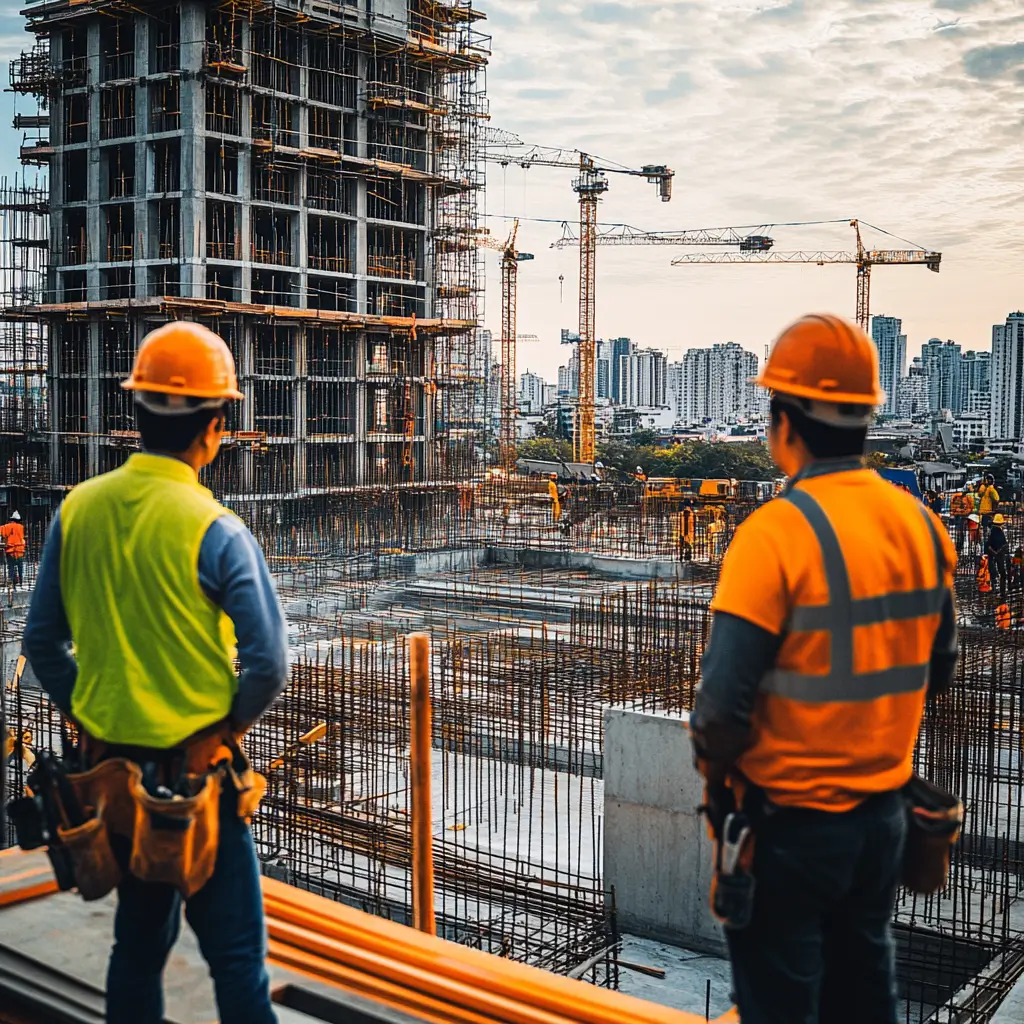How to Bid on Construction Jobs and Win Projects?
Do you know how important it is to bid on construction jobs to make your project successful? If not, then do not go anywhere.
Whether you are a general contractor or a subcontractor dealing with specific construction jobs, bidding can be challenging. In the industry, a 5:8 hit ratio is considered successful. It means you win 1 of every 5 projects you bid on.
A thorough understanding of the procedure and the approach you should follow as a contractor is essential for successful bidding. Continue reading for comprehensive details on every stage of the construction bidding process.
What is Bidding in Construction?
Construction bidding is sending bid proposals to clients for project management. The proposals usually include work scopes, takeoff information, and cost estimates.
The client starts the bidding process by requesting offers from various contractors. Winning bids allows contractors to grow their firms and land new projects. Unsuccessful bidders, however, can utilize the input from the bidding procedure to enhance their project bids in the future.
Bid The Project in 9 Steps!
The five primary steps of the construction project bidding process are usually contract formation, project delivery, bid solicitation, bid submission, and bid selection. We’ve included four additional processes —due diligence, bid preparation, bid development, bid review, and leveling—that you shouldn’t skip.
The construction bidding process steps are given below:
Bid Solicitation
It is the first phase, during which a property owner or his representative contacts contractors and asks for bids. It is actually an invitation, which can be in the form of an Invitation for Bid (IFB), Request for Quote (RFQ), or Request for Proposal (RFP).
Generally, agencies must extend an open invitation to eligible contractors registered for government construction work for public projects. Bids for private projects could be more specialized, distributed to a select few contractors, or handled by a bid management platform.
The project owner’s solicitation packet contains important information like:
-
-
- Specifications for construction
- Project specifications
- Type of contract
- Method of project delivery
- Requirements for insurance and bonds
-
Due Diligence
If your research indicates that the project isn’t a good fit or risks your profitability, it’s advisable to decline and politely thank the customer for the chance. It is detrimental to both parties to pursue a bid that is out of line with your strengths.
Furthermore, all project participants must perform due diligence. General contractors (GCs) perform due diligence for subcontractors, while clients do the same for GCs. This construction jobs bidding process guarantees that all parties engaged can fulfill the project’s requirements and aids in assessing the suitability of possible partners.
Preparing the Bid and Collecting Data from Subcontractors
Contractors carefully prepare their bids using the information in the solicitation packet. This process includes creating cost estimates, project timetables, suggested building techniques, materials, and any other needs included in the RFP.
If they want to participate in the bidding process, subcontractors will have access to the pertinent project materials and start drafting their bidding for construction contracts.
If they encounter any details that need clarification, they send their inquiries to the general contractors (GCs) submitting bids for the project.
Bid Creation
After carefully reviewing every project specification, we write a bid package that details our construction bid strategy, highlights our qualifications, and shows our dedication to completing the project on schedule and effectively.
To further bolster our bid, we find and assess possible subcontractors via the Request for Qualifications (RFQ) procedure.
Through this procedure, we can ask eligible subcontractors to send us their resumes, emphasizing their background, skills, and previous work on related projects.
Bid Submission
A crucial stage in the process is the bid submission, in which contractors give the project owner their official construction job proposals.
Essential elements of a bid proposal consist of:
- Cost Estimates
Comprehensive projections derived from the plans, labor, materials, equipment, overhead, profit margins, and bill of goods. Estimating software might be used to assure accuracy.
- Details About the Company
Details on the contractor’s background, completed projects, and management style.
- Bid Bond
A bid bond may be included if needed to ensure the contractor can finish the project according to their proposal.
Assessment and Leveling of Bids
Bid leveling is a crucial step in the bid review process that the bid solicitor undertakes after contractors submit their bids. Bid leveling standardizes bid submissions, which makes comparisons easier because bid submissions come in a range of formats and price points.
To ensure that all offers may be evaluated similarly, the project owner examines each bid during bid leveling to align the forms and specifications. This procedure assists the owner in precisely comparing the bids to identify the best contractor for the job. Leveling the bids allows the owner to make a better-informed choice that takes the contractor’s credentials and pricing into account.
Selection of Bids
Property owners usually select the bid with the most competitive or lowest price during the bid selection phase. Government rules frequently require that the lowest bidder be given the contract for public projects, guaranteeing impartiality and openness in the selection procedure.
However, owners of private or commercial enterprises take into account several criteria in addition to pricing, such as:
- Project Experience
It is a history of comparable projects completed by the contractor.
- Safety Record
It means the dedication of the contractor to safety procedures and standards.
- Scheduling Philosophy
A contractor’s method is used to establish project schedules and timetables.
Formation of Contracts
Following bid selection, the contractor and project owner proceed to the contract creation phase, when they finalize the construction contract’s conditions.
The contract creation phase is crucial in the contractor bidding guide process. It is the contractor’s final chance to negotiate and settle conditions.
It safeguards the interests of the owner and the contractor and creates the legal foundation for the project. It is crucial to avoid feeling under duress when signing a contract before you have read and agree to its provisions.
Also Read : Top 10 Construction Quotes to Inspire Your Next Project
Delivery of the Project
The winning construction projects delivery method greatly influences how bids are requested, presented, and assessed, even though it isn’t a formal component of the bidding process. The property owner chooses the project delivery method prior to the start of the bidding process, which outlines each party’s obligations, risks, and tasks.
In the construction industry, typical project delivery techniques include:
-
- Design-build (DB)
- DBB, or design-bid-build
- Project delivery that is integrated (IPD)
- Risk-based construction management (CMAR)
- Multi-Prime Construction Management (CMMP)
- PPPs P3s, or public-private partnerships
Expert Tips for Quality Construction Bidding
After outlining the essential elements of a successful construction bid, we can discuss some helpful advice to improve your bidding process. Several tactics, ranging from due diligence and research to efficient communication and technology use, can increase your chances of landing profitable construction jobs. Here are some of the best construction bidding tips you must follow:
- Choosing projects carefully to prevent financial waste.
- Bid leveling is used to provide an apparent bid.
- Preserving a suitable bid-hit ratio to remain competitive.
- Gain a thorough comprehension of the project.
- Check the information that has been provided.
- Examine the bidder’s credentials and experience.
- Determine any dangers and problems with compliance.
- Creating an unambiguous chain of command for communication.
- Choosing the best communication channel for the given message.
- Using active listening techniques.
- Using newsletters and emails to inform stakeholders.
- Using virtual or online presentations to communicate effectively.
Consider USA Estimators for the Valuable and Success-Generating Bidding Assistance!
You must optimize your construction project bidding process to stand out in the competitive construction sector. But who is providing the best solution for this? Take advantage of USA Estimators. It enables you to create successful RFP responses more quickly.
With its best-selling features, USA Construction Estimators enables you to swiftly assemble strong, persuasive proposals, preserve brand consistency, and easily access and display your greatest projects. Our company increases productivity and ensures that your bids accurately represent your experience level, which will help you secure more contracts and advance your firm.
Refrain from wasting your time in finding other estimation companies. Get your construction project estimation from us to win your bid!
FAQs
What is IPD in construction bidding?
The collaborative project delivery technique Integrated Project Delivery (IPD) brings together all essential parties under a single contract, including owners, contractors, architects, and engineers. IPD is especially helpful for complicated projects that require a variety of viewpoints from the outset.
How do you determine which contract is best for you?
The best type of contract is a lump-sum agreement, especially when building a structure. All project components are predetermined and outlined in a definite scope of work. The owner knows the cost upfront, and the contractor can control expectations.
What should you leverage in the construction bid?
Highlight previous assignments where your group collaborated well, especially on challenging or creative ideas. Show off your proficiency using digital technologies. Emphasize your capacity to coordinate your objectives and manage common risks. Give instances of innovative solutions and demonstrate your capacity for original thought in a group setting.
FAQs:
Why is motivation essential in the building industry?
Low employee motivation frequently causes delays in construction projects. Project managers can give motivational rewards and certifications to keep the morale of workers up. This way, they can get more and more efficient outcomes.
What are the advantages of motivational sayings?
Motivational quotes have an impact on our brains, behaviors, and lives because they give us a sense of self-efficacy and control over our own success.
What are the motivational goals?
Creating situations that encourage people to work with zeal, initiative, interest, and enthusiasm is the goal of motivation.






